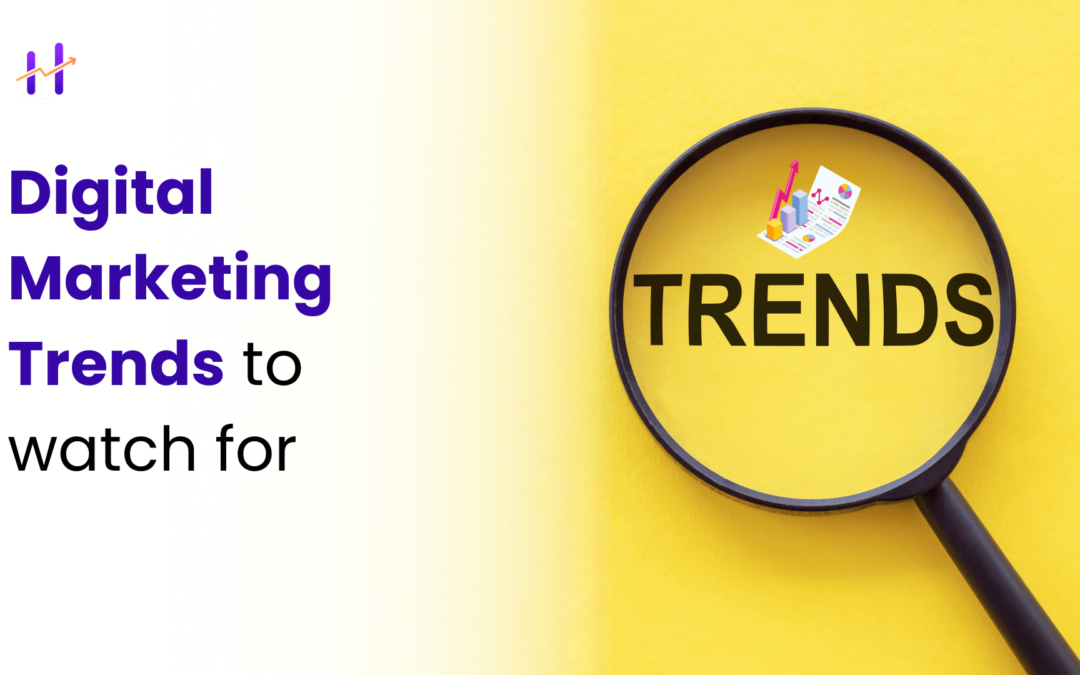Digital Marketing has revolutionized the way businesses connect with their audiences. As we move ahead in this ever-evolving digital world, marketers need to keep a close eye on the latest digital marketing trends that shape the industry.
In this article, we will explore 5 Digital Marketing trends that are set to make waves and impact the industry in the coming years.
Digital Marketing Trends 2023: Why They Matter
In today’s digital world, where technology is constantly evolving, it’s not enough to rely on outdated strategies. Embracing the latest trends allows marketers to leverage new opportunities, connect with their target audience in more meaningful ways, and drive better results for their businesses.
By staying informed and adapting to these emerging digital marketing trends, marketers can gain a competitive edge and make the most of the digital marketing landscape.
So, without further ado, let’s dive into the five digital marketing trends that are set to dominate in 2023 and beyond.
Trend 1: Artificial Intelligence (AI) in Marketing
Artificial Intelligence, or AI, is more than just a buzzword. It’s a game-changer and among the latest digital marketing trends that are revolutionizing the way businesses connect with their customers.
AI empowers marketers with powerful tools and technologies that can automate processes, analyze vast amounts of data, and deliver personalized experiences like never before.
Chatbots
Imagine having a 24/7 customer service representative that never gets tired or overwhelmed. That’s precisely what AI-powered chatbots bring to the table.
These virtual assistants can interact with website visitors, answer their questions, and provide assistance, all in real time. They enhance customer experiences, save time, and improve customer satisfaction.
Predictive Analysis
But AI’s capabilities extend far beyond chatbots. It can analyze data to identify patterns and trends, enabling businesses to make data-driven decisions.
Predictive analytics, powered by AI, can forecast customer behavior, allowing marketers to tailor their campaigns and offers for maximum impact.
Personalization
Personalization has become a vital aspect of successful marketing strategies, and AI plays a crucial role in making it possible.
By analyzing customer data, AI can provide personalized content recommendations, making sure that each customer receives relevant information and experiences that resonate with their interests and needs.
Marketing Automation
Another area where AI shines is marketing automation. By automating repetitive tasks such as email campaigns, social media posting, and ad targeting, marketers can free up valuable time to focus on strategy and creativity.
AI algorithms can optimize ad targeting, ensuring that the right message reaches the right audience at the right time, resulting in higher conversion rates and better returns on investment (ROI).

Embracing AI in your marketing strategies can help you stay ahead of the competition and unlock the full potential of digital marketing in the ever-evolving digital landscape.
Trend 2: Voice Search Optimization
In the age of smartphones and smart speakers, voice search has emerged as a popular way for users to interact with their devices.
With the rise of virtual assistants like Siri, Alexa, and Google Assistant, people are increasingly using their voices to search for information, ask questions, and even make purchases.
As a result, voice search is one of the rising digital marketing trends. And voice search optimization has become a crucial aspect of digital marketing strategies.
So, how can businesses optimize their content for voice search? Let’s dive in!
Optimize for Voice Search
Firstly, it’s important to understand that voice search queries differ from traditional text-based searches. When users type a query, they typically use shorter phrases or keywords.
However, in voice search, users tend to ask questions in a more conversational tone. Therefore, it’s essential to optimize your content with long-tail keywords and natural language that aligns with how people speak.
Structured Data
Structured data markup is another critical element of voice search optimization. By implementing schema.org markup on your website, you provide search engines with structured data that helps them understand your content better.
This, in turn, increases the chances of your content being featured as a rich snippet in voice search results, enhancing your visibility and attracting more organic traffic.
Local SEO
Local SEO is particularly important in the context of voice search. Many voice searches have local intent, such as “Where is the nearest coffee shop?” or “Find a mechanic near me” or “Dentists near me”.
To capitalize on these opportunities, make sure your business information is up to date on online directories, optimize your Google My Business listing, and focus on local keywords. This will help voice assistants provide accurate and relevant information to users in your vicinity.
Mobile Optimization
With the majority of voice searches occurring on mobile devices, ensuring that your website is mobile-friendly and loads quickly is essential. Optimize your site’s design and layout for smaller screens, improve page loading speed, and ensure a seamless user experience across devices.

In short, voice search is rapidly gaining traction, and businesses need to adapt their digital marketing strategies accordingly.
Trend 3: Video Marketing Dominance
If a picture is worth a thousand words, then a video is worth a million! Video marketing has skyrocketed in popularity and has become of the dominant digital marketing trends in the industry.
With the rise of platforms like YouTube, TikTok, and Instagram Reels, video content is capturing the attention of audiences like never before.
So, why is video marketing so powerful? Let’s dive in and explore its key aspects.
First and foremost, video content consumption is on the rise. People are more inclined to watch a video than read a lengthy article or text-based content. Videos can convey information, evoke emotions, and tell compelling stories in a visually engaging way.
By incorporating videos into your marketing strategies, you can capture and retain your audience’s attention more effectively.
The versatility of video formats is another advantage. Whether it’s a short, snappy video for social media, an in-depth product demonstration, or a live stream, there’s a video format suitable for every platform and marketing objective.
Experimenting with different video formats can help you find what resonates best with your target audience and drive higher engagement.
Live Streaming
Live streaming has also emerged as a powerful tool within video marketing. Platforms like Facebook Live, Instagram Live, and YouTube Live allow businesses to connect with their audience in real time, fostering a sense of authenticity and interactivity.
Live streams can be used for product launches, behind-the-scenes glimpses, Q&A sessions, and even virtual events, enabling direct engagement and building a loyal community.
Video SEO
Optimizing videos for search engines is vital for maximum visibility. Just like text-based content, video SEO plays a crucial role in driving organic traffic.
Focus on optimizing video titles, descriptions, and tags with relevant keywords. Additionally, creating transcripts and captions for your videos can enhance accessibility and improve search engine indexing.
Track the Metrics
Tracking engagement metrics is essential to measure the success of your video marketing efforts. Metrics such as view counts, watch time, likes, comments, and shares provide valuable insights into audience preferences and behavior.

Analyzing these metrics can help you refine your video strategies, create more targeted content, and maximize your return on investment.
Trend 4: Influencer Marketing Evolution
Influencer marketing has come a long way and continues to emerge as one of the hottest digital marketing trends.
While it initially focused on collaborating with celebrities and well-known personalities, influencer marketing has now shifted towards a more authentic and targeted approach, making way for micro and nano influencers.
Micro and Nano Influencers
Gone are the days when brands solely relied on big-name celebrities to promote their products or services. Enter micro and nano influencers, individuals with smaller but highly engaged followings in niche markets.
These influencers have a more intimate connection with their audience, fostering a sense of trust and authenticity.
Authenticity and relevance have become key factors in successful influencer partnerships. Consumers today are looking for genuine recommendations from people they can relate to.
Micro and nano influencers, with their niche expertise and authentic storytelling, provide an ideal platform for brands to connect with their target audience on a deeper level.
Measure the ROI
Measuring the return on investment (ROI) of influencer marketing has also become more refined. Marketers now have access to advanced analytics and tracking tools that can provide valuable insights into the effectiveness of influencer campaigns.
Metrics such as engagement rates, click-through rates, and conversions help businesses assess the impact of their collaborations and make data-driven decisions.
Legal and Ethical Considerations
Legal and ethical considerations are also important in influencer marketing. Regulations and guidelines have been established to ensure transparency and disclosure in influencer-brand relationships.
It’s crucial for brands and influencers to adhere to these guidelines, clearly indicating when content is sponsored or includes affiliate links. By being transparent, brands can build trust with their audience and maintain a positive reputation.

Influencer marketing has evolved into a more targeted and authentic approach, focusing on micro and nano influencers who have a genuine connection with their audience. In conclusion, influencer marketing continues to be one of the most prominent digital marketing trends.
Trend 5: Privacy and Data Protection
In the digital age, privacy, and data protection have become increasingly important concerns for consumers. With growing awareness about data breaches and privacy violations, people are demanding more control over their personal information.
As a result, privacy and data protection have emerged as another one of the most significant digital marketing trends.
So, what does this mean for businesses and their digital marketing strategies? Let’s explore!
Growing concerns over data privacy and security
Firstly, transparency and consent are paramount when collecting and using customer data. Businesses must be clear about the type of data they collect, how it will be used, and who will have access to it.
Obtaining explicit consent from customers before collecting their data is crucial. Implementing robust data privacy policies and clearly communicating them to customers can build trust and establish a positive relationship.
Impact of GDPR and other privacy regulations
Furthermore, data protection regulations such as the General Data Protection Regulation (GDPR) have been introduced to safeguard consumer privacy rights.
These regulations require businesses to handle personal data securely, provide individuals with the right to access and control their data and report any data breaches promptly. Adhering to these regulations not only ensures compliance but also demonstrates a commitment to protecting customer privacy.
As consumers become more privacy-conscious, they expect personalized experiences without sacrificing their privacy. Anonymizing and aggregating data can help businesses deliver personalized marketing campaigns while respecting individual privacy.
By analyzing trends and patterns without identifying specific individuals, businesses can provide relevant content and offer without compromising sensitive information.
Build trust with Customers
Another aspect of privacy and data protection is the responsible use of customer data. Businesses must ensure that the data they collect is used ethically and for legitimate purposes.
Unauthorized sharing or selling of customer data can erode trust and damage brand reputation. By implementing strict internal policies and protocols, businesses can ensure that customer data is used responsibly and in compliance with privacy regulations.
Conclusion: Digital Marketing Trends
As we look ahead to the future, it’s clear that several key digital marketing trends will shape the industry. From the integration of artificial intelligence (AI) to the rise of voice search optimization, the dominance of video marketing, the evolution of influencer marketing, and the growing emphasis on privacy and data protection, businesses must stay informed and adapt their strategies to stay competitive.
As you navigate the dynamic world of digital marketing, remember to stay informed, experiment with new strategies, and always prioritize the needs and preferences of your target audience.
By continuously adapting and evolving your approach, you’ll be well-equipped to succeed in the exciting and ever-changing realm of digital marketing.
In conclusion, staying ahead of digital marketing trends is essential for businesses to thrive in the ever-evolving digital landscape.
And if you need any help or assistance to scale your business/brand in this ever-evolving digital world, feel free to Schedule a 1 on 1 Consultation with our experts.

